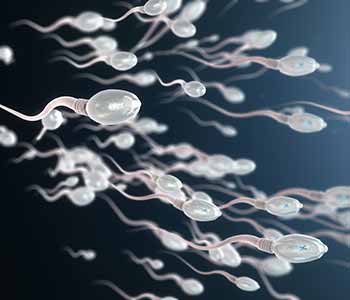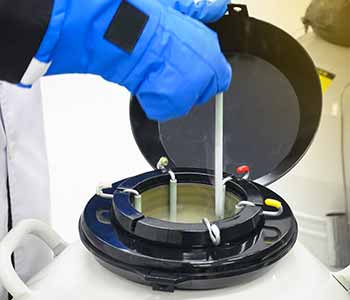A guide to sperm banking from one of the country’s top male infertility experts
Parenting can still be in your future by partnering with one of the country’s leading male infertility experts, Dr. Jeffery Buch, and the NTMIC Sperm Lab. Unparalleled diagnostics and storage protocols contribute to a sperm banking center serving Frisco, Dallas, greater Northwest Texas, and beyond with a history of helping couples achieve their family goals – in one case, 14 years after specimens were first stored!

Basics: What is Sperm Banking?
“Banking” refers to collecting, freezing, and storing sperm for potential future use. Advances in assisted reproductive technologies mean the highest quality sperm isn’t a “must” for banking to be successful. You and your partner may become pregnant with minimal specimens.
Also known as “Cryobanking,” sperm banking has allowed millions of men to become fathers who otherwise wouldn’t be able to have biological children. When approaching a major surgery or treatment for medical conditions, discussing how these procedures and therapies may affect fertility is always a good idea. For example, cancer treatments damage cells that develop into sperm, and there is no guarantee these cells will recover.
Awareness is the first step to preserving your potential to enjoy fatherhood in the future. Adult men can have their sperm frozen and stored at any time. Collecting and freezing several samples is generally advised to increase the odds of successful conception later in life.
Collection and testing

While the testes are constantly making sperm, it’s best to collect specimens at least 48 hours after having sex. It takes time to replenish sperm levels after each ejaculation. Waiting allows maximum semen volumes to recover.
NTMIC Sperm Lab is known for its advanced, accurate diagnostics. A small portion of every sample is removed for testing. When our professionals analyze these samples, they’re looking for characteristics such as:
- Concentration – Number of sperm per millimeter of semen
- Motility – Percentage of sperm that move
- Total number of sperm in a sample
- Morphology – Percentage of cells that are normal
Visit our sperm analysis page for more information.
The quality of your sperm can be damaged temporarily or permanently. Illness, procedures that require general anesthesia, or factors like heavy tobacco and alcohol use may be to blame. We’ll discuss these and other considerations with you before the specimens are stored.
Even if you have low sperm counts or other issues that affect overall quality, banking can be successful. Some assisted reproductive techniques require the injection of a single live sperm cell into the egg.
Freezing
Ideally, samples should have “optimal density” or sperm counts. The sooner collections are banked, the better the density. To ensure timely storage, you must schedule an appointment with NTMIC Sperm Lab. Samples may be collected at home or at a discreet space in our facility. We’ll provide more information on how to collect samples, but generally, you should avoid lubricating products that destroy sperm.
Our facility doesn’t accept samples from patients who tested positive for HIV or hepatitis. Don’t forget to bring the results from these tests with you. Tests must be conducted within a week of your appointment.
Specimens are divided into small vials, and a portion of the sample is thawed and examined within a day or two of the initial freezing. Not all sperm cells survive the freezing and thawing process. The results from these tests help NTMIC Sperm Lab determine the optimal number of samples required to ensure successful treatment. Higher-quality sperm generally have a better recovery rate post-thawing, So fewer specimens may need to be stored.
Samples are labeled and tracked for utmost accuracy and confidentiality. A specialized preservative protects sperm during the process. And ultimately, your vials are stored in extremely cold temperatures using state-of-the-art storage and monitoring equipment to maintain an effective yet constant temperature. The rate of sperm that fail to survive after 48 hours is slight; our lab can maintain useable specimens indefinitely. These samples don’t deteriorate even after years in the “deep freeze.”
Dreams for your family realized

We’ve helped couples have healthy children with sperm frozen for up to 14 years! If sperm is of sufficient quality, artificial insemination may be recommended. And the more samples are stored, the greater your odds of a successful pregnancy. More samples allow for more insemination attempts. Depending on your treatment approach of choice, a single sample may be adequate. But it’s always a good idea to store several samples. In general, bank at least three specimens for every desired pregnancy.
Dr. Buch and his team understand the deeply personal nature of sperm banking. Considerations extend beyond analysis, collection, and freezing; it’s important to consider the wishes for remaining stored sperm, for instance, if you pass away unexpectedly.
We welcome your questions. Call (972) 616-4477 to reach our understanding and talented team at NTMIC Sperm Lab in Frisco, TX.








